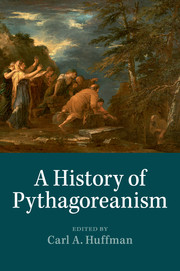Book contents
- Frontmatter
- Contents
- Contributors
- Abbreviations
- Introduction
- Chapter 1 Pythagoras
- Chapter 2 Philolaus
- Chapter 3 Archytas
- Chapter 4 Sixth-, fifth- and fourth-century Pythagoreans
- Chapter 5 The Pythagorean society and politics
- Chapter 6 The Pythagorean way of life and Pythagorean ethics
- Chapter 7 Pythagoreans, Orphism and Greek religion
- Chapter 8 The problem of Pythagorean mathematics
- Chapter 9 Pythagorean harmonics
- Chapter 10 The Pythagoreans and Plato
- Chapter 11 Aristotle on the “so-called Pythagoreans”: from lore to principles
- Chapter 12 Pythagoreanism in the Academic tradition: the Early Academy to Numenius
- Chapter 13 The Peripatetics on the Pythagoreans
- Chapter 14 Pythagoras in the historical tradition: from Herodotus to Diodorus Siculus
- Chapter 15 The pseudo-Pythagorean writings
- Chapter 16 Pythagoreans in Rome and Asia Minor around the turn of the common era
- Chapter 17 Diogenes Laertius’ Life of Pythagoras
- Chapter 18 Porphyry's Life of Pythagoras
- Chapter 19 Iamblichus’ On the Pythagorean Life in context
- Chapter 20 Pythagoras and Pythagoreanism in late antiquity and the Middle Ages
- Chapter 21 Pythagoras in the Early Renaissance
- Bibliography
- General index
- Index locorum
- Greek index
Chapter 11 - Aristotle on the “so-called Pythagoreans”: from lore to principles
Published online by Cambridge University Press: 05 May 2014
- Frontmatter
- Contents
- Contributors
- Abbreviations
- Introduction
- Chapter 1 Pythagoras
- Chapter 2 Philolaus
- Chapter 3 Archytas
- Chapter 4 Sixth-, fifth- and fourth-century Pythagoreans
- Chapter 5 The Pythagorean society and politics
- Chapter 6 The Pythagorean way of life and Pythagorean ethics
- Chapter 7 Pythagoreans, Orphism and Greek religion
- Chapter 8 The problem of Pythagorean mathematics
- Chapter 9 Pythagorean harmonics
- Chapter 10 The Pythagoreans and Plato
- Chapter 11 Aristotle on the “so-called Pythagoreans”: from lore to principles
- Chapter 12 Pythagoreanism in the Academic tradition: the Early Academy to Numenius
- Chapter 13 The Peripatetics on the Pythagoreans
- Chapter 14 Pythagoras in the historical tradition: from Herodotus to Diodorus Siculus
- Chapter 15 The pseudo-Pythagorean writings
- Chapter 16 Pythagoreans in Rome and Asia Minor around the turn of the common era
- Chapter 17 Diogenes Laertius’ Life of Pythagoras
- Chapter 18 Porphyry's Life of Pythagoras
- Chapter 19 Iamblichus’ On the Pythagorean Life in context
- Chapter 20 Pythagoras and Pythagoreanism in late antiquity and the Middle Ages
- Chapter 21 Pythagoras in the Early Renaissance
- Bibliography
- General index
- Index locorum
- Greek index
Summary
Introduction
Aristotle's reports on the philosophy of the “so-called Pythagoreans” are among our earliest sources for the history of Pythagoreanism. According to Aristotle, these Pythagoreans championed both a theory of principles (ἀρχαί) in which numbers (or the elements of numbers) play a fundamental role, and an astronomical system in which not only the five ordinary planets, the sun and the moon, but also the earth itself and even an additional counter-earth orbit around a central fire. The purpose of this chapter is to analyze the most comprehensive account of the Pythagorean theory of principles in Aristotle's extant work: the first part of Metaphysics A5.
Aristotle's treatment of “the so-called Pythagoreans” is distinguished from the rest of Metaphysics A by a feature which previous scholarship has tended to underrate: the focus here is on the intellectual development of the Pythagorean school. Aristotle's sketch of this development, however, is based on a much fuller treatment, which Aristotle had included in his monograph on the Pythagoreans. Whereas the monograph itself is now lost, Alexander of Aphrodisias, in commenting upon our chapter of the Metaphysics, supplies ample additional information gathered from the monograph. This evidence should be used in order to supplement the picture emerging from an analysis of Metaphysics A5.
Keywords
- Type
- Chapter
- Information
- A History of Pythagoreanism , pp. 227 - 249Publisher: Cambridge University PressPrint publication year: 2014
- 2
- Cited by

